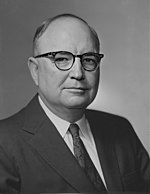Eastland v. United States Servicemen's Fund
| Eastland v. United States Servicemen's Fund | |
|---|---|
 | |
| Argued January 22, 1975 Decided May 27, 1975 | |
| Full case name | James Eastland v. United States Servicemen's Fund |
| Citations | 421 U.S. 491 (more) 95 S. Ct. 1813; 44 L. Ed. 2d 324 |
| Argument | Oral argument |
| Decision | Opinion |
| Holding | |
| The activities of the Senate Subcommittee, the individual Senators, and the Chief Counsel fall within the "legitimate legislative sphere," and those activities are protected by the absolute prohibition of the Speech or Debate Clause of the Constitution against being "questioned in any other Place," and hence are immune from judicial interference. | |
| Court membership | |
| |
| Case opinions | |
| Majority | Burger, joined by White, Blackmun, Powell, Rehnquist |
| Concurrence | Marshall, Brennan, Stewart |
| Dissent | Douglas |
| Laws applied | |
| Speech or Debate Clause, U.S. Const. Amend. I | |
Eastland v. United States Servicemen's Fund, 421 U.S. 491 (1975), was a United States Supreme Court case that defined the limits of Congress's authority to issues subpoenas. In an 8–1 decision, the court found that Congress was within its constitional powers to issue a subpoena for the banking records of the United States Servicemen's Fund.[1]
Background

James Eastland was a Democratic senator from Mississippi, who supported American involvement in the Vietnam War and chaired the Senate Subcommittee on Internal Security. The United States Servicemen's Fund (USSF) was a non-profit organization that was outspoken in its opposition to the war.
Eastland's committee subpoenaed the USSF's banking records.
Consequences
Eastland v. United States Servicemen's Fund was cited in court cases involving the Tax returns of Donald Trump. Trump claimed that Congress had exceeded its authority in subpoenaing the returns.[2]
References
External links
- Text of Eastland v. United States Servicemen's Fund, 421 U.S. 491 (1975) is available from: CourtListener Justia Library of Congress Oyez (oral argument audio)
